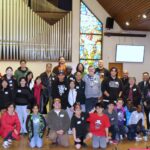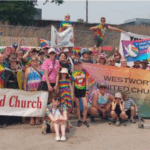
Land recognition text for Prairie to Pine Regional Council of The United Church of Canada
(PDF version of this page.)
Prairie to Pine Regional Council is located on lands covered by Treaties 1, 2, 3, 4, 5, and 9. These are the traditional and ancestral lands of many Indigenous peoples, including Anishinaabeg (Ojibwe/Saulteaux), Nehethowuk (Rocky Cree), Ininiwak (Swampy Cree), Nehiyawak (Plains Cree), Anishininewak (Ojibwe-Cree), Dakota, Dene; and the homeland of the Red River Métis.
Treaties created relationships between Treaty partners and the agreements that they made were intended to be mutually beneficial. The Treaties are living documents that include all of us and so we are all Treaty People. We acknowledge that five Dakota communities in Manitoba are not signatory to any treaty with Canada.
As Indigenous and non-Indigenous people who call this land home, we know that the mistakes which are part of our history of colonization have caused deep and lasting harm.
We affirm that the Sovereignty and distinct Nationhood of Indigenous Peoples needs to be upheld and that the sustaining connection to traditional and ancestral lands must support in practical ways this Sovereignty and Nationhood.
We commit ourselves to the truth-telling that needs to continue to happen as we seek reconciliation and healing and as we work toward a better future.
About these words
Prairie to Pine Regional Council thanks the many people who helped create these important words. Committee: M Chorney, Diane Dwarka, Dr Stewart Hill, Jan Van Aertselaer.
Elders consulted: Adrian Jacobs and Stan Mckay.
Reviewed by the Equity and Diversity Committee, and reviewed and approved by the Prairie to Pine Executive, 2 December 2021.
These are living words that will change and grow over time. They will be updated as needed. In particular, we welcome correction and knowledge from Indigenous people and peoples. Any suggestions or concerns can be sent to prairietopine@united-church.ca and staff will send them on to the Executive and appropriate knowledge keepers.
Using these words: All communities of faith, ministries, and groups within our Regional Council are urged to develop your own contextual land recognition. Please feel free to use the Regional Council wording as one guide, recognizing that there are many different ways to offer a heartfelt and committed land recognition or acknowledgement.






